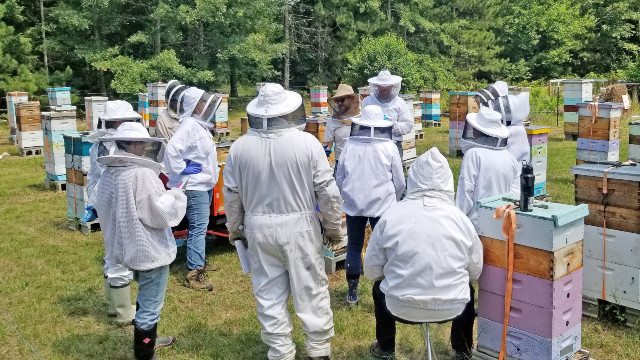By Carol Stiffler
A few miles east of Newberry on M-28, Adam and Lacey Ingrao keep between 70 and 100 beehives in the Bee Wise Farms apiary. The farm is locally known for its honey, but nationwide it’s also known as an agricultural classroom.
Combining their expertise – his in the military, agriculture, and entomology, and hers as a transpersonal psychologist specializing in nature-based therapy – they developed the Heroes to Hives programs to teach veterans the practice of beekeeping.
The program is now in its ninth year and more than 11,000 veterans have come through the program. Adam Ingrao said 2,600 people have signed up for this year’s program so far, and registration is open through February 28. Participants will follow the nine-month course, completing up to 43 lessons online and receiving the option to pass a final exam for a bee-keeping certificate. Some students will also be able to visit expert apiaries, like Bee Wise Farm, for hands-on experience.
“It’s going to be another really big year,” said Ingrao.
And it will likely only get bigger: the Heroes to Hives program has recently been awarded a grant providing nearly $120,000 over three years. The professional development grant will be used to create a “train the trainers” course for United States Department of Veterans Affairs (VA) staff and beekeeping educators with the intent to spread the therapeutic practices learned in the Heroes to Hives program.
There is therapy in beekeeping, Ingrao said, like there is with any creature humans care for, and there are therapeutic elements to each learning module of the Heroes to Hives program.
“It seems to be that when individuals connect with organisms outside of themselves, especially when that is a relationship that requires care of those organisms, it seems to really bring people out of their shells,” Ingrao said. “Organisms you have to check in with that you’re caring for and are caring for you as well–that ends up leading to positive mental health outcomes.”
The program is open to veterans, active military members, and their dependents and is offered for free. Developed by the Ingraos, it is also supported by the VA and the Michigan Food and Farming Systems.
Veterans may take the course for a number of reasons – to learn a hobby, to start a business, or anything in between. Some of them will end up tending bees after, but not everyone does.
Gould City resident Gerry Blanchard, a Marine Corps and Army Ranger veteran, took the Heroes to Hives program three years ago. He signed up before realizing the course was directed by Adam Ingrao, and that Ingrao lived only 30 miles away from Blanchard.
“I want to do something,” Blanchard said. “I’m 73 years old. I was looking at various things that I could do when I was 80 or 85 as a recreational activity.”
When he learned that Bee Wise Farms was so nearby, he jumped in “with both feet”.
He’s kept bees ever since, starting with three hives and increasing since to 13. A member of the Sault Tribe of Chippewa Indians and the smaller non-profit Scott Point Tribe of American Aboriginals, he thought beekeeping would be an excellent practice for fellow tribal members. He has inspired tribal involvement and keeps hives on private property owned by tribal members. Some also help tend the bees.
In his first year, Blanchard’s Gould City bees produced 35 pounds of processed honey. Last year, they harvested about 170 pounds.
“We gift it. We thought about selling it,” he said. “But we said we’re just going to gift it.” He gets a lot of requests for more gifted honey.
His tribal beekeepers are also planning to support native bees, work they’d like to begin next summer.
The program has done more than give Blanchard a new hobby. It also led him to seek help for post-traumatic stress disorder (PTSD) he’d carried since departing the military about 50 years ago.
“Heroes to Hives has been very helpful,” Blanchard said. “It really got me to go to the VA and start doing some PTSD stuff. I did several weeks of that, but I probably never would have gotten into that had I not met [Adam Ingrao] and got in with the bees. I thought ‘This is really good. Maybe I should start to focus on some of these other things’, which I did.”
Blanchard highly recommends the program and has encouraged others to complete it.
“It’s really amazing,” he said. “You really felt comradery.”
Blanchard has 17 service-connection injuries recognized by the VA, which brings him a mix of good and bad days.
“I can be pretty mobile, but some days are pretty bad,” he said. “If you take your time with the bees, and don’t try to overdo it, it all works out. No matter what happens with the tribe, the bees, and what direction the group’s going to go, I’ll always have some hives.”












